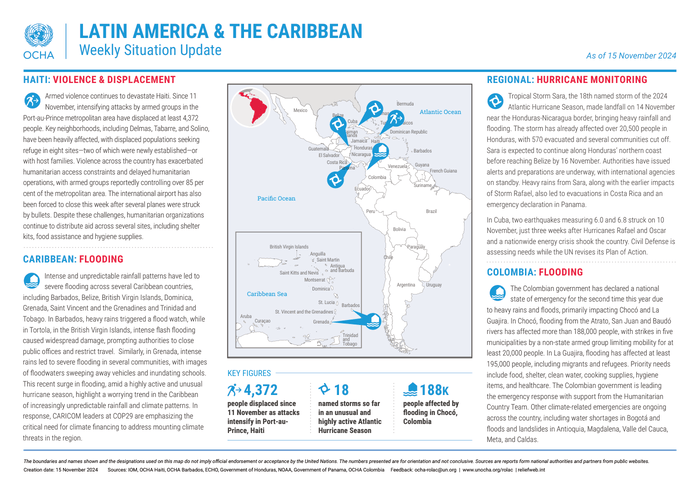Latin America & The Caribbean Weekly Situation Update as of 15 November 2024 – Colombia
KEY FIGURES
4,372 people displaced since 11 November as attacks intensify in Port-au-Prince, Haiti
18 named storms so far in an unusual and highly active Atlantic Hurricane Season
188K people affected by flooding in Chocó, Colombia
HAITI: VIOLENCE & DISPLACEMENT
Armed violence continues to devastate Haiti. Since 11 November, intensifying attacks by armed groups in the Port-au-Prince metropolitan area have displaced at least 4,372 people. Key neighborhoods, including Delmas, Tabarre, and Solino, have been heavily affected, with displaced populations seeking refuge in eight sites—two of which were newly established—or with host families. Violence across the country has exacerbated humanitarian access constraints and delayed humanitarian operations, with armed groups reportedly controlling over 85 per cent of the metropolitan area. The international airport has also been forced to close this week after several planes were struck by bullets. Despite these challenges, humanitarian organizations continue to distribute aid across several sites, including shelter kits, food assistance and hygiene supplies.
CARIBBEAN: FLOODING
Intense and unpredictable rainfall patterns have led to severe flooding across several Caribbean countries, including Barbados, Belize, British Virgin Islands, Dominica, Grenada, Saint Vincent and the Grenadines and Trinidad and Tobago. In Barbados, heavy rains triggered a flood watch, while in Tortola, in the British Virgin Islands, intense flash flooding caused widespread damage, prompting authorities to close public offices and restrict travel. Similarly, in Grenada, intense rains led to severe flooding in several communities, with images of floodwaters sweeping away vehicles and inundating schools. This recent surge in flooding, amid a highly active and unusual hurricane season, highlight a worrying trend in the Caribbean of increasingly unpredictable rainfall and climate patterns. In response, CARICOM leaders at COP29 are emphasizing the critical need for climate financing to address mounting climate threats in the region.
REGIONAL: HURRICANE MONITORING
Tropical Storm Sara, the 18th named storm of the 2024 Atlantic Hurricane Season, made landfall on 14 November near the Honduras-Nicaragua border, bringing heavy rainfall and flooding. The storm has already affected over 20,500 people in Honduras, with 570 evacuated and several communities cut off. Sara is expected to continue along Honduras’ northern coast before reaching Belize by 16 November. Authorities have issued alerts and preparations are underway, with international agencies on standby. Heavy rains from Sara, along with the earlier impacts of Storm Rafael, also led to evacuations in Costa Rica and an emergency declaration in Panama.
In Cuba, two earthquakes measuring 6.0 and 6.8 struck on 10 November, just three weeks after Hurricanes Rafael and Oscar and a nationwide energy crisis shook the country. Civil Defense is assessing needs while the UN revises its Plan of Action.
COLOMBIA: FLOODING
The Colombian government has declared a national state of emergency for the second time this year due to heavy rains and floods, primarily impacting Chocó and La Guajira. In Chocó, flooding from the Atrato, San Juan and Baudó rivers has affected more than 188,000 people, with strikes in five municipalities by a non-state armed group limiting mobility for at least 20,000 people. In La Guajira, flooding has affected at least 195,000 people, including migrants and refugees. Priority needs include food, shelter, clean water, cooking supplies, hygiene items, and healthcare. The Colombian government is leading the emergency response with support from the Humanitarian Country Team. Other climate-related emergencies are ongoing across the country, including water shortages in Bogotá and floods and landslides in Antioquia, Magdalena, Valle del Cauca, Meta, and Caldas.
Disclaimer
- UN Office for the Coordination of Humanitarian Affairs
- To learn more about OCHA’s activities, please visit https://www.unocha.org/.

